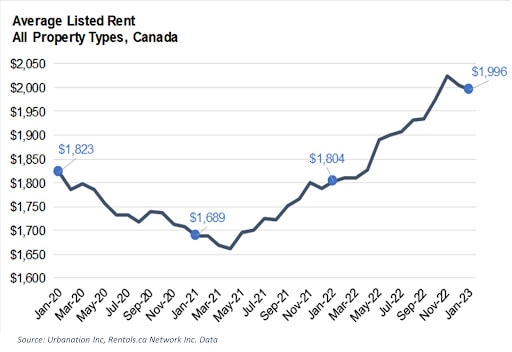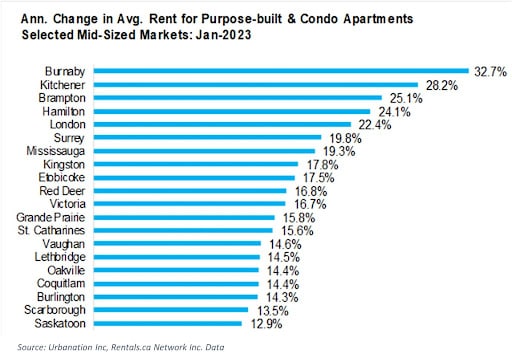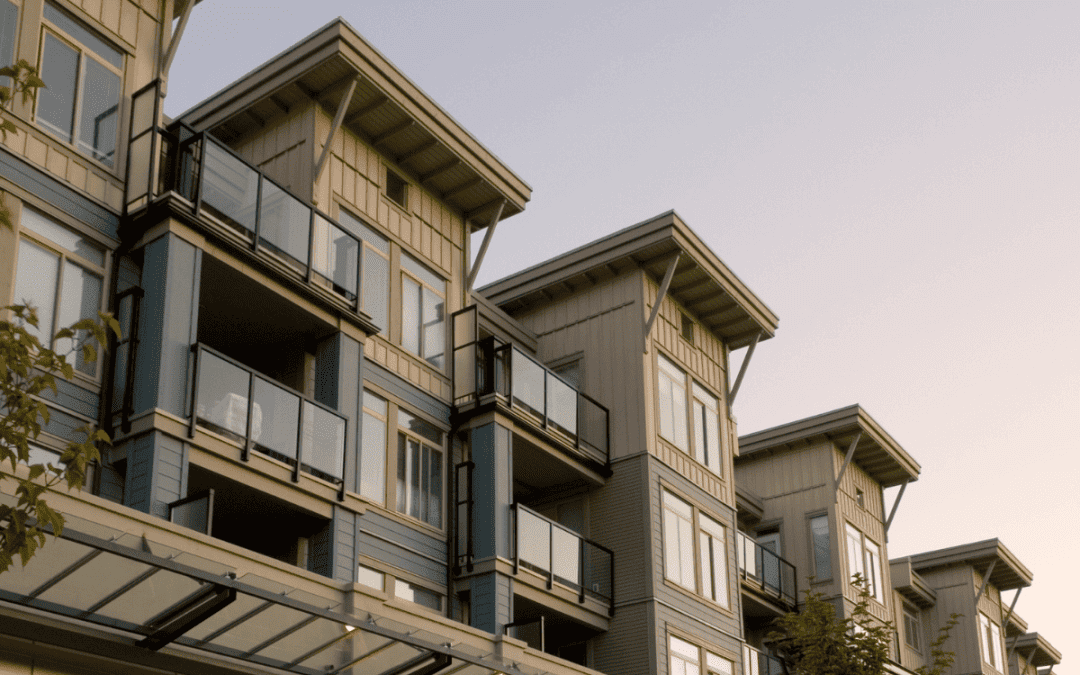The average listed rent for all property types in Canada rose 10.7 per cent year over year in January, the ninth straight month for double-digit increases, according to the latest national rent report from Rentals.ca and Urbanation.
The average listed rent for all property types was $1,996 in January, decreasing 0.5 per cent from December after averaging above $2,000 during the previous two months.
Compared to the pre-pandemic average rent in January 2020 of $1,823, rents in Canada increased by 9.5 per cent, equal to an average annual increase of 3.2 per cent.
Low supply and rising demand
“The Canadian rental market started 2023 where it ended in 2022, posting sharp annual rent growth amid low supply and quickly rising demand,” said Shaun Hildebrand, president of Urbanation. “Outside of Toronto, rent increases are becoming more acute in markets in B.C. and Alberta, which are experiencing relatively strong rates of population growth.”

Vancouver
Vancouver once again tops the list of 35 cities for average monthly rent. In January, the average monthly rent in the city for a one-bedroom was $2,730, and the average monthly rent for a two-bedroom was $3,624.
Year-over-year, average rents in January for a one-bedroom in Vancouver was up 24.2 per cent and up 20.9 per cent for a two-bedroom.
Month-over-month, the average rent was up in Vancouver in January for a one-bedroom home by 5.2 per cent and up 1.7 per cent for a two-bedroom.
Toronto
Toronto finished second on the list of 35 cities for average monthly rent in January for a one-bedroom at $2,458 and second for average monthly rent for a two-bedroom at $3,227.
Year-over-year, the average monthly rent in January for a one-bedroom in Toronto was up 20.8 per cent and up 17.2 per cent for a two-bedroom.
Montreal
Montreal came in 24th for average monthly rent in January for a one-bedroom home at $1,624 and 21st for a two-bedroom at $2,124.
Year-over-year, the average monthly rent in Montreal in January for a one-bedroom was up 7.6 per cent and up 7.7 per cent for a two-bedroom.
Condo rentals and apartments
Among Canada’s six largest rental markets, Vancouver and Calgary had the highest increases in average rent for condominium rentals and apartments in January, with annual growth of 22.9 per cent and 22.7 per cent, respectively. Toronto condo rental and apartment rents increased 20.8 per cent annually in January.
Average annual rents for condo rentals and apartments in Ottawa rose 11.5 per cent in January; average rents increased 9.3 per cent in Edmonton, and average rents for condo rentals and apartments were up 7.9 per cent in Montreal.
Medium-sized cities
Among 20 medium-sized cities, Burnaby’s average annual rents increased the most – by 32.7 per cent in January for condo rentals and apartments; Kitchener finished second with average rents up 28.2 per cent year-over-year in January for condo rentals and apartments; Brampton’s average rents in January rose 25.1 per cent; Hamilton average rents increased by 23.1 per cent and average annual rents in London increased 22.4 per cent for condo rentals and apartments.
New cities and areas in the top 20 for annual rent increases in January for condominium rentals and apartments include Red Deer (16.8 per cent), Grande Prairie (15.8 per cent), Vaughan (14.6 per cent), Oakville (14.4 per cent), and Coquitlam (14.4 per cent).
Among medium-sized markets, the three most expensive cities for average rents in January for condo rentals and apartments were in British Columbia: Burnaby ($2,947), Coquitlam ($2,680), and Richmond ($2,636).
The next six most expensive medium-sized rental markets were in the Greater Toronto Area: Vaughan ($2,581), Oakville ($2,549), Etobicoke ($2,541), Mississauga ($2,510), Brampton ($2,466), and Burlington ($2,418). All of the top 20 most expensive medium-sized rental markets were in either B.C. or Ontario.

Alberta leading rent growth, but still affordable
Alberta experienced the highest annual rent increase for condos and apartments in January, with 14.6 per cent growth, closely followed by B.C. at 14.4 per cent.
Ontario placed third with average annual rents up 13.5 per cent, while Nova Scotia’s average annual rents rose 12.3 per cent in January for condos and apartments.
Average annual rents rose nine per cent in January in Saskatchewan; Quebec average annual rents were up 7.6 per cent in January, and Manitoba rents increased seven per cent annually.
The report notes that Alberta’s condo and apartment rents were relatively affordable at an average of $1,435, with one-bedrooms averaging $1,271 and two-bedrooms averaging $1,595.
Average rents in British Columbia were 72 per cent higher than in Alberta at $2,471, with one-bedrooms averaging $2,163 and two-bedrooms averaging $2,769.
On average, apartment rents in Ontario were 5 per cent cheaper than in B.C. at $2,341, with one-bedrooms averaging $2,130 and two-bedrooms averaging $2,573.
Saskatchewan
The least expensive province in January was Saskatchewan at an average of $1,087, with one-bedrooms averaging $998 and two-bedrooms averaging $1,167.
One-bedroom average annual rents increased the most in January by 10.1 per cent to an average of $1,739 for condo rentals and apartments. Two-bedroom average annual rents rose 9.9 per cent to an average of $2,103 in January.
Studios recorded an 8.7 per cent annual increase in average rents for an average of $1,426. Three-bedroom average annual rents were up 5.7 per cent to an average of $2,364 for condo rentals and apartments in January.
Read the full rental report, including a detailed regional breakdown, here.
Paul Danison is the content director for Rentals.ca. Paul started his career covering sports, then chased news stories as a reporter. For 20-plus years, he worked as an editor at a major metropolitan newspaper.















